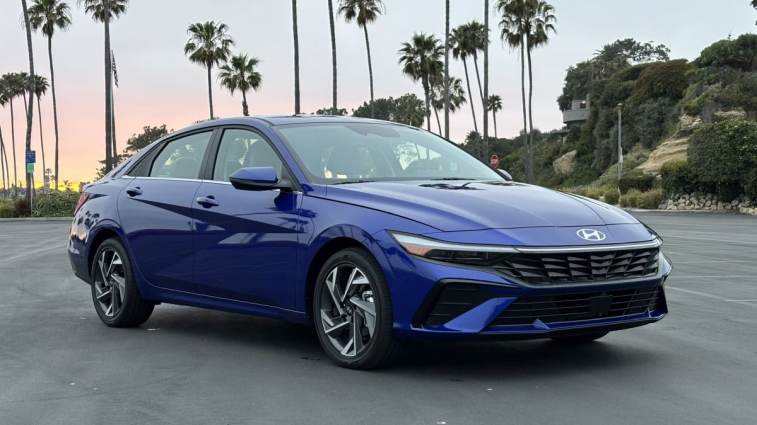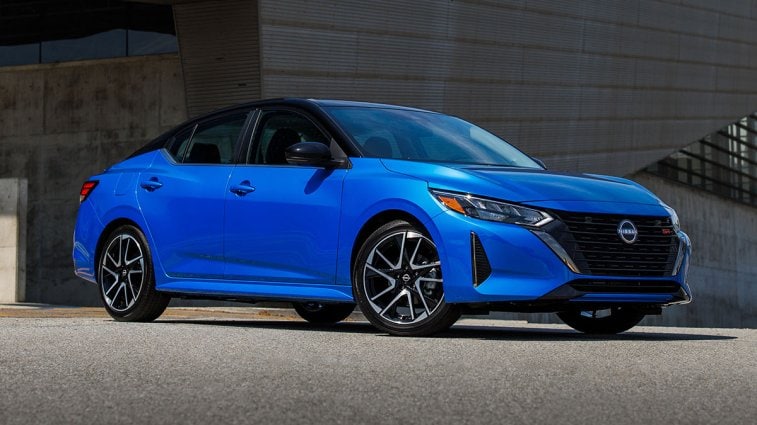Although SUVs have become more popular, compact cars still represent some of the most affordable and practical vehicles on the market. Small sedans still offer many good options for drivers looking for reliable transportation with modern technology and good fuel economy at a price that won’t break the bank.
Let’s compare the Hyundai Elantra and Nissan Sentra and see which compact car is better for you.
2025 Hyundai Elantra


The Hyundai Elantra may not have the sales numbers of the leaders in this class, but it’s a highly competitive compact car. We love that it has a hybrid option and a high-performance N model, plus it’s surprisingly spacious for its size. Did we mention the best-in-class warranty? Pricing starts at $23,025.
Hyundai Elantra Highlights
More rear legroom: A little extra room in the back seat goes a long way in a compact car. Your passengers will appreciate the extra three inches of legroom in the back of the Elantra compared to the Sentra.
Hybrid and N options: We always like to see mechanical variety, and the Hyundai Elantra has an efficient hybrid option that gets up to 54 combined mpg. There’s also a high-performance Elantra N with a whopping 276 horsepower and a manual transmission (an auto is optional). Meanwhile, the Sentra only has one powertrain option.
Class-leading warranty: The 5-year/60,000-mile basic warranty and 10-year/100,000-mile powertrain warranty give the Hyundai Elantra class-leading warranty coverage that Nissan can’t touch.
Read our Hyundai Elantra Expert Review or see 2025 Hyundai Elantra models for sale near you.
2025 Nissan Sentra


The Nissan Sentra is a practical compact car that gets the basics right. It’s stylish and efficient while having the technology and comfort we expect of a modern compact car. Pricing starts at $22,730.
Nissan Sentra Highlights
Stronger base engine: The Sentra’s sole engine option has 2 hp and 14 lb-ft of torque more than the Elantra’s base engine. Although that’s not a huge difference, it’s enough to give the Sentra a little extra pep in its step.
Zero Gravity seats: The front seats of Nissan models are consistently among the comfiest in their respective classes, thanks to what Nissan calls Zero Gravity seats. These were carefully engineered to reduce fatigue, and they make the Sentra one of the more accommodating compact cars for long road trips.
Contrast roof: A black contrast roof is a stylish option on the Nissan Sentra SR that you can’t get on the Hyundai Elantra. We especially like it with the Monarch Orange paint option.
Read our Nissan Sentra Expert Review or see 2025 Nissan Sentra models for sale near you.
Similarities
The Hyundai Elantra and Nissan Sentra have very similar sizing, pricing, and trunk space. They also have similar safety and infotainment tech features.
Conclusion
The Hyundai Elantra is generally a better compact car than the Nissan Sentra. The extra interior space, mechanical variety, and outstanding warranty coverage give the Hyundai the win over the Nissan. Whether you’re looking for a compact that’s efficient, sporty, or somewhere in-between, the Elantra model range has something for everyone shopping in this segment.
New 2025 Hyundai Elantra Prices
New 2025 Nissan Sentra Prices
|
$22,730 |
TBD |
|||
|
$23,430 |
TBD |
|||
|
$25,730 |
TBD |
The Kelley Blue Book Fair Purchase Price for any individual used vehicle can vary greatly according to mileage, condition, location, and other factors.
The prices here reflect what buyers are currently paying for vehicles and vehicles in typical condition when purchasing from a dealership.
These prices are updated weekly. The manufacturer’s suggested retail price (MSRP) quoted includes the destination fee, but does not include tax, license, document fees, and options.
| 2025 Hyundai Elantra | 2025 Nissan Sentra | |
| Popular Powertrains | ||
| Engine | 2.0-liter 4-cylinder | 2.0-liter 4-cylinder |
| Horsepower | 147 hp @ 6,200 rpm | 149 hp @ 6,400 rpm |
| Torque | 132 lb-ft @ 4,500 rpm | 146 lb-ft @ 4,400 rpm |
| Transmission | CVT automatic | CVT automatic |
| Fuel Economy | 32 city/41 highway/36 combined mpg | 30 city/40 highway/34 combined mpg |
| Also Available | Turbo 1.6-liter 4-cylinder, turbo 2.0-liter 4-cylinder, hybrid | N/A |
| Specs | ||
| Basic Warranty | 5 years/60,000 miles | 3 years/36,000 miles |
| Powertrain Warranty | 10 years/100,000 miles | 5 years/60,000 miles |
| NHTSA Overall Safety | 5 stars | 5 stars |
| Max Seating Capacity | 5 | 5 |
| Wheelbase | 107.1 inches | 106.6 inches |
| Overall Length | 184.1 inches | 182.9 inches |
| Width | 71.9 inches | 71.5 inches |
| Height | 55.7 inches | 56.9 inches |
| Turning Diameter | 35.4 feet | 38.1 feet |
| Headroom, Front | 40.6 inches | 38.9 inches |
| Headroom, Rear | 37.3 inches | 36.7 inches |
| Legroom, Front | 42.3 inches | 43.8 inches |
| Legroom, Rear | 38.0 inches | 34.9 inches |
| Shoulder Room, Front | 56.5 inches | 56.4 inches |
| Shoulder Room, Rear | 55.6 inches | 54.5 inches |
| Cargo Volume | 14.2 cubic feet | 14.3 cubic feet |

